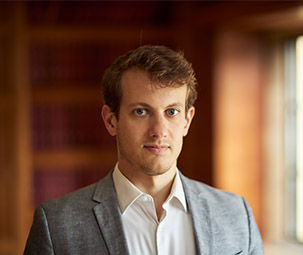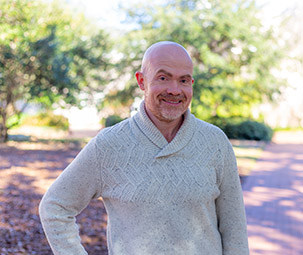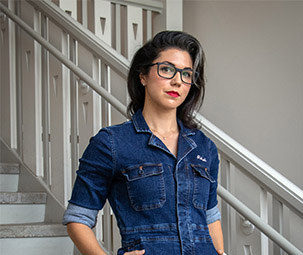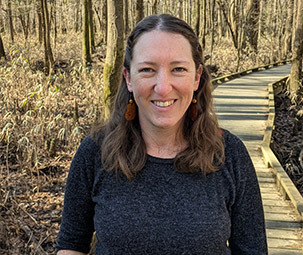The College of Arts and Sciences has selected seven new McCausland Faculty Fellows, recipients of the college’s most prestigious fellowship.
These faculty members represent a high standard of teaching excellence and a deep commitment to advancing research in their fields, which range from political science to visual art and from mathematics to criminology. They conduct research on topics as diverse as the capabilities of artificial intelligence in policing or artistic design to the plight of endangered whales and improving sustainability in chemical engineering.
The new McCausland Fellows in 2025 are:
- Ian Adams, Assistant Professor, Criminology & Criminal Justice
- Samuel Bagg, Assistant Professor, Political Science
- Jonathan Edwards, Associate Professor, English
- Meena Khalili, Associate Professor, School of Visual Art and Design
- Erin Meyer-Gutbrod, Assistant Professor, School of the Earth, Ocean and Environment
- Dmitry Peryshkov, Associate Professor, Chemistry & Biochemistry
- Changhui Tan, Associate Professor, Mathematics
“This year’s McCausland Fellows embody the spirit of academic leadership and intellectual curiosity the college strives for,” says Joel Samuels, dean of the College of Arts and Sciences. “Their research and creative endeavors inspire not only their colleagues but also the many students they mentor and teach. We are proud of their achievements and excited for the work they will continue to do as McCausland Fellows.”
The McCausland Faculty Fellowship supports early-career faculty as they develop as teachers and researchers. The program provides a salary enhancement for three years and a one-time research fund. The college established the program in 2014 with a $10 million endowment from alumnus Peter McCausland (’71 history) and his wife, Bonnie.
“We are deeply grateful to Peter and Bonnie McCausland for the generous gift that created the premier faculty fellowship in our college,” Samuels says. “The McCausland family’s investment in our faculty strengthens our commitment to impactful research and teaching.”
More about the 2025 McCausland Faculty Fellows
Ian Adams, Department of Criminology and Criminal Justice

Ian Adams is recognized for his outstanding contributions to policing research. Adams joined USC in 2022 after completing his Ph.D. at the University of Utah. His research focuses on the use of force, technology in policing and policy evaluation, with a specialization in body-worn cameras. He has published more than 40 peer-reviewed articles in top-tier journals in several disciplines, including Criminology & Public Policy, Public Administration Review and Journal of Criminal Justice and Journal of Experimental Criminology.
Adams has secured over $3 million in external funding for projects that explore pressing issues in contemporary policing, including the adoption of artificial intelligence tools and the development of accountability mechanisms within law enforcement agencies. He received the 2024 Early Career Award from the American Society of Criminology Division of Policing. Additionally, he works with the National Institute of Justice as a LEADS Academic, lecturing at the FBI’s National Academy in Quantico, VA, and consulting both domestically and internationally on police practices, use of force and technology.
In addition to his research, Adams excels as a teacher. His innovative approach to bridging classroom theory with real-world applications receives praise from students and colleagues. “Ian Adams' ability to combine high-caliber research with practical applications has already had a profound impact on the field of policing,” said department chair Wendy Regoeczi.
Samuel Bagg, Department of Political Science

Samuel Bagg is a rising star in political theory. Bagg earned his Ph.D. from Duke University and completed fellowships at McGill University and the University of Oxford prior to joining USC. His groundbreaking work explores the dynamics of social inequality and political power, offering fresh perspectives on democratic governance.
Bagg’s scholarship has appeared in top-tier journals such as American Political Science Review, American Journal of Political Science, Journal of Politics and Journal of Political Philosophy. His first book, The Dispersion of Power: A Critical Realist Theory of Democracy, published by Oxford University Press in 2024, presents a bold new framework for understanding and improving democracy in the face of elite capture and inequality.
Beyond his research, Bagg is a dedicated educator who teaches courses on political theory and actively mentors both undergraduate and graduate students. “Dr. Bagg’s intellectual ambition and ability to translate complex ideas into practical solutions make him an exceptional scholar and teacher,” says Brent Simpson, interim chair of political science.
Jonathan Edwards, Department of English Language and Literature

A first-generation college graduate, Jonathan J. Edwards has established himself as a prominent scholar in the study of rhetoric, political communication and religious discourse. His acclaimed book, Superchurch: The Rhetoric and Politics of American Fundamentalism (2015), has become an influential text in understanding the intersection of religion and politics in the U.S. He co-edited Rhetoric of the Protestant Sermon in America (2020), further contributing to the study of religious rhetoric.
Edwards has published extensively in top-tier journals such as Rhetoric Society Quarterly and Communication and Critical/Cultural Studies, and his innovative work spans multiple disciplines. His current research includes a second monograph, God’s Schoolbooks, which investigates the impact of Christian textbooks on American conservatism.
Edwards has taught courses ranging from public speaking to advanced rhetoric theory and consistently receives high praise from students and peers alike for his engaging and thoughtful instruction. English Department Chair Susan Courtney says, “We are lucky to have this outstanding scholar-teacher doing such important research on our faculty and engaging our students so powerfully in the classroom about the critical subjects he teaches.”
Meena Khalili, School of Visual Art and Design

Meena Khalili is an internationally recognized designer and educator recognized for innovation in art and in the classroom. She has received four international design awards as well as the National Award for Outstanding Professional Achievement in Graphic Design from the Southeastern College Art Conference. She was named a Global Top 30 Design Lecturer by The Design Kids in 2023.
Her designs have been featured in exhibitions at galleries across Europe, Asia and North America, and her artwork is in permanent collections around the world, including the Library of Congress.
Khalili's research explores cultural identity and generational storytelling, driven by her experience as an Iranian American. She has led significant grants, including a McCausland Innovation Fund award for integrating artificial intelligence into design education.
"Meena combines pedagogical innovation with creative research excellence,” says Laura Kissel, director of SVAD. “Her work demonstrates the potential to shape not only her field but also the next generation of designers through her committed teaching and mentorship."
Erin Meyer-Gutbrod, School of the Earth, Ocean and Environment

Erin Meyer-Gutbrod leads groundbreaking research in marine ecology and conservation. Her work focuses on the impacts of climate change on marine ecosystems, with particular attention to the critically endangered North Atlantic right whale. Meyer-Gutbrod's research has provided crucial insights to federal agencies like NOAA, helping to guide the management and conservation of endangered whale populations.
Since joining USC in 2020, she has published extensively, and her work has been cited over 800 times. Her work on climate-driven shifts in whale habitats continues to be featured in high-profile media outlets, including The New York Times and NPR.
In addition to her research, Meyer-Gutbrod actively engages in public outreach, education and mentorship. She serves on several committees focused on marine mammal conservation, including the U.S. Marine Mammal Commission’s Committee of Scientific Advisors. “Dr. Meyer-Gutbrod’s record shows that she is passionate about conservation science, education, public outreach and fostering a diverse and inclusive field, and she will continue to share these values with the Gamecock community,” says Gene Yogodzinski, interim director for the SEOE.
Dmitry Peryshkov, Department of Chemistry and Biochemistry

Dmitry Peryshkov is recognized for his contributions to the fields of inorganic and organometallic chemistry. His research in metal-free catalysis is helping to reduce the use of expensive and sometimes toxic metals in the chemical and pharmaceutical industries by finding more sustainable ways to catalyze reactions.
Peryshkov’s research achievements are widely recognized, with over 58 peer-reviewed publications, including several featured in top journals such as Journal of the American Chemical Society and Chemical Science. His work has earned him prestigious accolades, including the NSF CAREER Award and the Doctoral New Investigator Award from the American Chemical Society Petroleum Research Fund. His latest work on boron clusters for metal-free bond activation has advanced the understanding of chemical transformations, addressing key challenges in sustainability.
“Dr. Peryshkov is pushing the boundaries of inorganic chemistry, with discoveries that are poised to transform the field,” says Qian Wang, chair of the Department of Chemistry and Biochemistry.
Changhui Tan, Department of Mathematics

Changhui Tan is recognized for his exceptional research in nonlinear partial differential equations (PDEs) and fluid dynamics. His work addresses complex challenges in physical and biological systems, blending mathematical modeling with innovative analytical and computational methods.
Since joining USC in 2018, he has established himself as a leader in his field, securing over $705,000 in National Science Foundation funding and receiving an NSF CAREER Award in 2023. His papers have appeared in journals such as Annals of PDE and SIAM Journal of Mathematical Analysis. He has given over 100 invited talks, sharing his cutting-edge work with the global scientific community.
Tan teaches a wide range of undergraduate and graduate courses, from calculus to advanced topics in applied mathematics. His teaching evaluations reflect his ability to engage and inspire students, and he mentored two Ph.D. graduates, both securing prestigious postdoctoral positions.
“Dr. Tan is an emerging leader in the department, and his dedication to both research and education makes him an invaluable asset to USC,” says past department chair, Matthew Boylan.